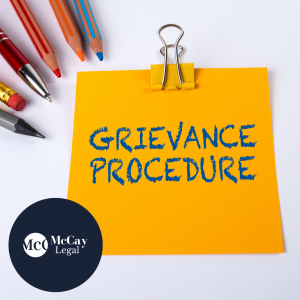
Challenges can arise at various stages throughout the employment relationship, necessitating the
implementation of disciplinary and grievance procedures to address these issues fairly and
consistently. Consequently, it is imperative for employers to develop procedures that consider the
perspectives of both the employer and the employee. Employers should ensure compliance with their
established procedures as well as the Labour Relations Agency Code of Practice on Disciplinary and
Grievance Procedures.
implementation of disciplinary and grievance procedures to address these issues fairly and
consistently. Consequently, it is imperative for employers to develop procedures that consider the
perspectives of both the employer and the employee. Employers should ensure compliance with their
established procedures as well as the Labour Relations Agency Code of Practice on Disciplinary and
Grievance Procedures.
Dealing with a Grievance
It is beneficial to avoid an antagonistic approach when dealing with an employee’s grievance and to
remain open–minded. Employees who lodge a formal grievance are often experiencing distress and it
is important to respond suitably to avoid exacerbating the situation.
Investigation
The investigation should be conducted by a suitable line manager or a representative from HR.
However, in cases where the issues raised are particularly serious or complex, it is recommended to
appoint a more senior or experienced individual. It is imperative that the investigator has no prior
involvement with the matters raised in the grievance.
The investigation is a fact–finding exercise to gather all necessary information regarding the concerns
outlined in the grievance. Failing to conduct a reasonable investigation prior to making a decision may
result in a potentially unfair decision and could expose the employer to potential legal action. After
the investigation is completed, a written report should be produced outlining the investigation’s scope,
the process and a summary of the findings.
Grievance meeting
The grievance meeting should be conducted promptly following receipt of the grievance. It may be
suitable for the investigator to chair the grievance meeting, or you may prefer to appoint someone
who has not previously been involved in the grievance.
The employee should be invited to the grievance meeting and sufficient notice should be given to
enable the employee to prepare for the meeting. The employee should also be informed of their right
to be accompanied by a colleague or a trade union representative. A note–taker should also be present
at the meeting.
During the meeting, the employee must be afforded the opportunity to explain their grievance. The
chairperson should then take the employee through the investigation report and any evidence that
has been collected. After all parties have explained their positions and there are no further questions,
the meeting should be adjourned to allow the chairperson to reflect on the employee’s statements
and reach a decision.
Upon reaching a decision, the chairperson should re–convene the meeting to communicate the
outcome to the employee. While it is necessary to provide the decision in writing, it is preferable to
communicate it in person beforehand. The employee should also be made aware of their right to
appeal the decision if they are dissatisfied, and clear instructions on how to proceed with an appeal
should be provided.
communicate it in person beforehand. The employee should also be made aware of their right to
appeal the decision if they are dissatisfied, and clear instructions on how to proceed with an appeal
should be provided.
Appeal
Any appeal should be conducted by a senior individual who has not previously been involved in the
grievance. The individual handling the appeal should have access to the evidence collected during the
investigation and the notes from the grievance meeting, but they should not consult with the
chairperson of the grievance meeting prior to the appeal.
The employee has the right to be accompanied by a colleague or a trade union representative and
must be granted an opportunity to present their arguments. In certain instances, it may be appropriate
to evaluate the original decision based on the existing paperwork and the employee’s submission,
however there may be instances where a complete re–hearing of the evidence is required. The
outcome of the appeal should be communicated to the employee in writing.
McCay Legal can assist both employers and employees in navigating grievances effectively in order to
avert the possibility of costly and time–consuming Tribunal claims.
Contact us on 02871 371 705.
Written by Kerri McGrory
